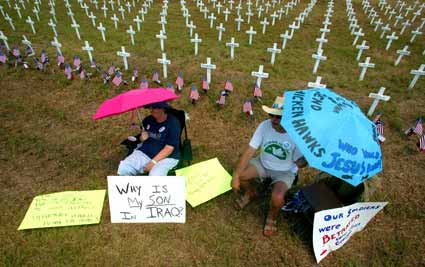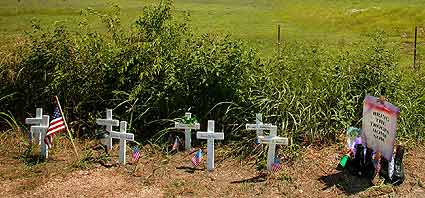---George
Wallace-
"DEEP
IN THE HEART OF CRAWFORD"
---
1.
HOLDING DOWN THE FORT
It
sneaked up on me really.
I
do think that what a person does in life is a complex package of
political
statements, but I'm not a particularly active person politically speaking. During
the Vietnam War I protested some. The usual stuff, really - when Nixon came to
the War Memorial in Syracuse in 1968, for example, I sang 'Sounds of Silence'
along with all the others over his 'secret plan' to end the war; helped shut down
the campus during the Kent State spring, too, til the school figured out most
of the students just wanted a free pass to head for Florida. They declared the
school year over and the protests fizzled.
That
was over thirty years ago, and if there's any other moment besides that when I
was politically active, I can't think of it. Oh yeah, two years ago I contributed
a poem to the online Poets Against the War collection that Sam Hamill was putting
together.
On the
other hand I feel I've consistently served my community, my nation and humanity
- as a Peace Corps volunteer, as a public health worker, as an Air Force Hospital
Administrator, as a community journalist.
The
fact is, I've thought a lot about the war in Iraq and it has been bugging me more
and more, but I hadn't once thought about speaking out in any big dramatic way,
even as the machinations of the Bush Administration in constructing a false rationale
for the war became more and more obvious.
But
that was before Cindy Sheehan - the mother of a soldier who had died in Iraq,
who sat down in a ditch at a Texas crossroads just outside the Crawford ranch
of President Bush, and vowed to stay there during his month-long vacation. She
wanted the president to meet with her and answer a simple, decent question - What
was the noble cause that her son Casey died for in Iraq?
The
president wouldn't come out. And Cindy Sheehan wouldn't budge. It was a standoff
in the hot Texas sun.
I
immediately admired the action as being pure, simple, cutting through the divisive
rhetoric so prevalent in the political scene today.
Maybe
in part it was because the media were all over Crawford, all month, with not much
else to write about. Maybe in part it was the symbolism of the situation, or the
fact that Cindy Sheehan was putting a face on an anti-war feeling that's been
growing in the nation. Or maybe it was just the idea that a cat ought to be able
to look at a king.
Whatever
the reason, Cindy's story kept growing.

Then
a neighbor shot a rifle over Cindy's head, 'dove hunting' he drawled in laconic
Texan; and another local ran over several dozen crosses she'd put out on the side
of the road to note those who had died in Iraq. And to top that off, talk show
hosts on radio and television - in my view outright propagandists and stalking
dogs for the President - began trying to smear her and attack her.
Now
it's one thing for the talking heads to trash each other, they get paid lots of
bucks to do that. And it's one thing for politicians to take swipes at each other.
But here's this
huge political machine bearing down on the mother of a dead soldier in a bar ditch
outside the Bush Ranch in Crawford?
It
just got to me, that's all I can say.
So
I wrote a poem for Cindy Sheehan, and right on the spot decided to deliver it
to her. I decided to meet with Cindy myself - or at least stand shoulder to shoulder
with those in her camp, to show I support what she was doing.
After
passing the hat among some great poetry friends, I flew out - negotiated my way
through striking airline mechanic picket lines through Minneapolis to Dallas,
and drove the two hours south to the town of Crawford, Texas, pop. 705.
Little
did I know I was destined to help 'hold down the fort' for Cindy during the portion
of her vigil when she had to return home temporarily. Little did I know it was
going to be a chance to meet with hundreds from around the country, from mothers
of Iraqi soldiers to vets themselves, not to mention the likes of Joan Baez, Margo
Kidder and Steve Earle.
Little
did I know I was about to become a small part of history - to help light a spark
that could very well change the course of America. I stood shoulder to shoulder
with Cindy Sheehan's August 2005 vigil in Crawford, Texas.
2.
PEACE, ON THE WRONG SIDE OF THE TRACKS
So out across the cottonfields
of Texas I went, south from Dallas, through the city of Waco, blasting through
Texas heat and terrible radio, looking for an occupied ditch outside George Bush's
'Western
White House.'
This
is an attractive part of the state, quite unlike Wichita Falls where I'd spent
some time while studying hospital administration one horrible winter in the 1970s.
The central part of Texas from Fort Worth to Austin is rich with rolling green
fields and prairies, full with farmable land and dotted with healthy looking small
towns.
It is also
populated, strangely enough to a Northerner's eyes, with innumerable welders and
sheetmetal artisans. Everything - houses, sheds, massive ranch 'entrances' at
the ends of driveways, water windmills, deer blinds - seems to be made of the
stuff.
Even The
Peace House in Crawford, which I reached by late Saturday afternoon,
has its sheetmetal moment - in the form of a huge 'Peace is not an Illusion' screen,
cut out of the stuff, and propped up to obscure a view of the cottage's bathroom
window from the road it sits along, on the wrong side of town.
To
say that the Peace House is on the wrong side of the tracks in Crawford, Tx, population
705, is no exaggeration.
The brainchild of a few locals, when it came
time for them to find an affordable refuge for liberal thought in town, they had
to go across the tracks from the wealthier side of town - the side where there's
no streetlights, many tiny tract houses and mobile homes.
The
wrong side of the political spectrum for a conservative little town like Crawford,
it seems, needs to be shunted aside |
|
|
John
Wolf, one of the co founders of Crawford Peace House, told me the story of the
place as he brushed fireants off his shirt and back. A school Social Studies teacher,
he reckons that it's very tough not to be conservative in the small town like
that. His Grandpa, he told me, remembers the KKK and how if you didn't belong
to it, you might as well leave town. John Wolf said he thought he'd taught his
students better than to think that way over the years, but now here it was the
new millennium, there was war in Iraq, and the young adults were just as conservative
as their parents and grandparents had been.
"How
did they turn out this way?" he lamented. We talked about how Americans are
being fed the same truisms over and over by talk show hosts and cable television
'news' stations, and how a strategy like that proved so effective in fascist nations.
"You repeat something long enough and people believe it, they say it themselves,
it becomes a conditioned reflex.'
Where
there is no vision the people perish. Fortunately for Crawford, Wolf and others
did not lose their vision, even if they saw media blackouts and increasing dominance
of big media venues by propaganda mongers and henchmen of the oligarchy. So when
the War in Iraq broke out Wolf and friends opened the place in March 03 on the
strength of sales of anti-war buttons at $1 a go. They even found a way to do
a showing of the film Fahrenheit 9-11, despite the difficulty in finding a venue.
In the end they opted for an inflatable screen in the football field, 3000 showed
up in the town of 700, over the shouts of pro-war protesters.
A
new line of fire ants climbed up the porch column as John Wolf was telling me
this. In fact they seem to leap onto him as he swayed and talked. He was soon
covered in them, despite my attempts to brush them off.
We
went out to the Labyrinth ('It's not a maze,' someone said pointedly - 'a maze
is an Elizabethan Folly sort of thing, while a labyrinth is more primal than that,
who knows what you'll find in the middle, expect a minotaur at the center, or
enlightenment, or maybe just a Peace Pole'). The object is to slow down your thought
process, like a Zen stepping stone garden, by walking the labyrinth. Slow down
and contemplate peace.
So
we walked slowly, John explaining that recently things had gotten pretty tough
for the Crawford Peace House - in fact, the place was down to its last three bucks
and the telephone had been cut off.
Then
Cindy showed up.
Now,
he says, they've got $150,000 in the bank and they've paid off the mortgage.
Next
Page . . .

